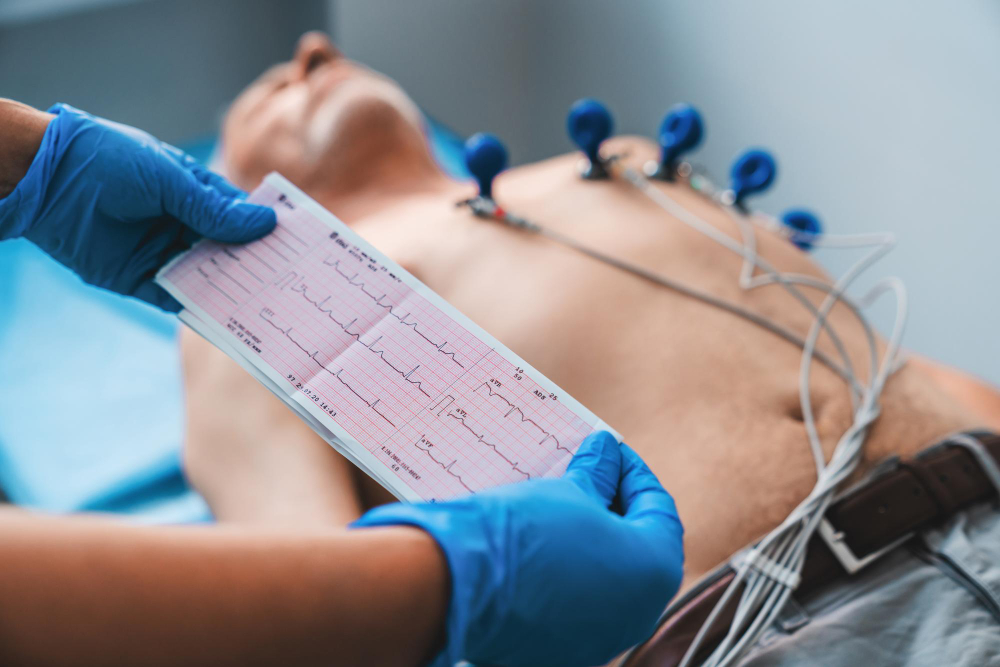Heart arrhythmia symptoms can be sneaky, showing up when you least expect them. It’s like your heart has its own beat routine, sometimes going too fast or too slow. Recognizing this dance is crucial. By staying alert, you can spot the signs early and get peace of mind.
Common Symptoms of Heart Arrhythmia
Let’s dive into the common symptoms of abnormal heart rhythm. These can vary, but some usual suspects stand out.
- Chest Pain or Pressure
Feeling chest pain or a tight squeeze often tops the list of common symptoms. It can mean your heart is working too hard or struggling to keep pace. This pain might feel like a heavy weight pressing down, often catching you off-guard during exercise or stress. While not always doom and gloom, ignoring these cues isn’t wise as it might signal deeper heart issues.
- Breathlessness
Struggling to catch a breath, whether you’re sprinting up stairs or just lounging, can be a tell-tale sign. When the heart’s rhythm is out of whack, it can affect your breathing. Breathlessness during physical exertion is a big hint, but feeling out of breath when chilling? That’s a red flag too.
- Heart Palpitations
Heart skipping a beat? Or pounding so hard you can feel it in your chest, neck, or throat? These flutters or jumps are quite common among arrhythmia heartbeat patterns. It might just be your heart having a dance-off, but if it becomes a regular performance, it’s time to chat with a pro.
- Chronic Fatigue
Feeling tired all the time, no matter how much sleep you get, is like dragging a heavy weight. This unexplained tiredness is an oft-ignored arrhythmia of the heart symptom that deserves attention. If regular activities leave you more pooped than usual, it might be more than just needing a good night’s rest.
Recognizing Severe Indicators and Risk Factors
Some signals scream “Don’t ignore me,” and they can lead to serious heart problems.
- Frequent Dizziness or Lightheadedness
Ever felt dizzy standing up or just out of the blue? This head-spinning sensation might suggest your heart isn’t distributing blood evenly. This dizziness can pose a serious risk, hinting at potential heart conditions.
- Unexplained Swelling
Notice swelling in your legs or feet without reason? It can not only be annoying but also worrying. This can mean your heart’s struggling, causing fluid to build up. Keep an eye on sudden puffiness.
- Sudden Weight Gain
Packing on pounds quickly, especially when you’re not indulging in extra treats, is worth monitoring. It could signal water retention and more profound heart health issues. Sudden weight gain isn’t just cosmetic; it can be a heart indicator.
- Family History and Personal Health
Genetics play a crucial role in heart health. If family members have heart issues, you’re also in the lineup. Knowing when to seek genetic testing can pinpoint risks early.
The Importance of Early Detection and Treatment
Catching arrhythmia signs early makes a significant difference. So, when should you pick up the phone and call the doctor?
- When to Consult a Doctor
If any of the heart arrhythmia symptoms mentioned are regular guests in your life, it’s time. Ignoring these signs might put you on a risky path. A swift doctor visit can clear doubts faster than a home remedy binge.
- Traditional and Alternative Treatments in India
In India, you’re spoiled for choice. From ancient practices like yoga to acupuncture, alternatives thrive alongside medicine. Ayurvedic principles focus on balancing imbalances, offering lifestyle and diet tweaks, while modern medicine provides medication and surgical options.
Traditional methods — like meditation and diet adjustments — help reduce stress on the heart. However, they’re often paired best with conventional medicine for effective arrhythmia treatment. Discussing with specialists ensures you get the best of both worlds.
- Expert Insights from Cardiologists
Cardiologists are great sources of heart wisdom, dispelling common myths while offering tips. They advocate for managing stress, quitting smoking, and keeping blood pressure in check. Simple lifestyle changes can substantially improve heart health.
- Regular Health Check-Ups
Routine check-ups play a huge role in catching sneaky arrhythmia of the heart symptoms. Annual visits to the doctor shouldn’t be skipped. A quick chat and some basic tests can prevent bigger issues down the road. Early detection means fewer surprises in the future.
To wrap up, heart arrhythmia symptoms need attention. They don’t always mean your heart is failing, but it’s crucial not to dismiss the signals. By understanding what to look out for and when to act, you empower yourself towards better heart health. Don’t shy away from seeking help or more information to keep your heart happily beating along.
